Previously on Drokk!: Ignore everything we’ve been talking about in recent episodes — well, not entirely, but for the most part — because we’re stepping outside of the regular Case Files chronology to tackle the Restricted Files once again this time around.

0:00:00-0:02:36: In which we introduce ourselves and the fact that we’re covering Judge Dredd: The Restricted Files Vol. 3, covering stories from annuals and seasonal specials from 1990 through 1993. It is, to say the least, a mixed bag.
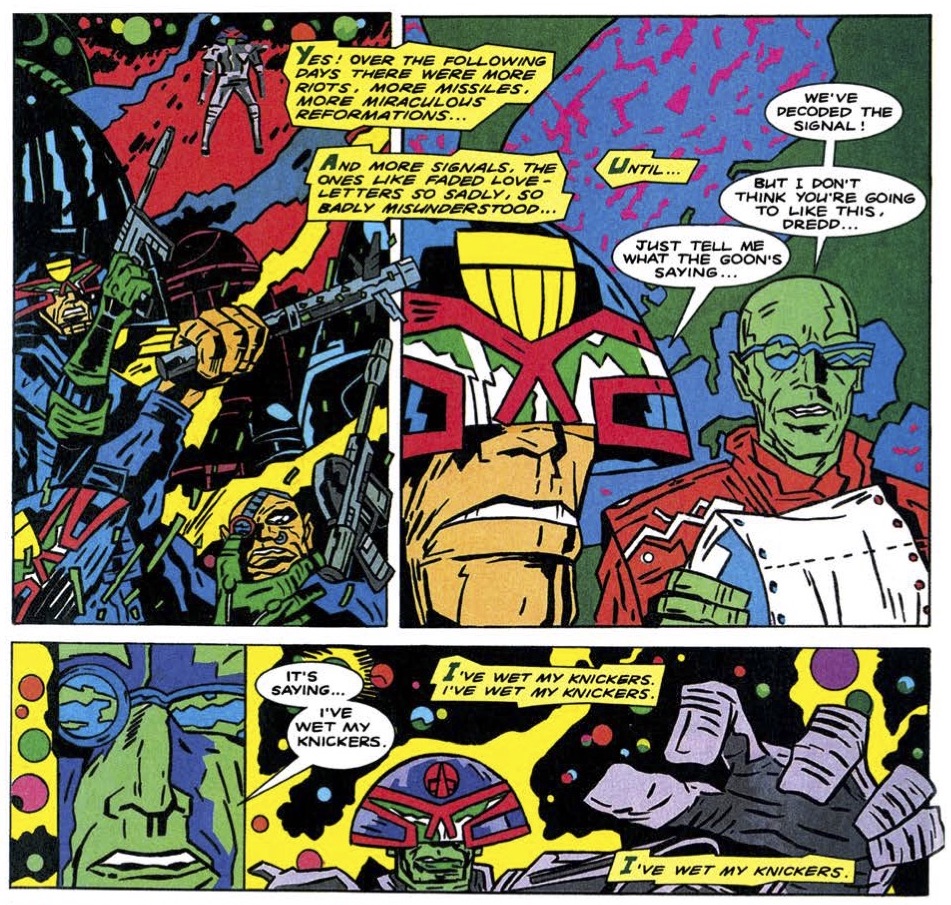
0:02:37-0:14:59: As we start picking through that bag, we talk about the era of Dredd that these stories were published in — an era that saw John Wagner move away from the strip, at least in 2000 AD, and be replaced first by Garth Ennis, and then by Mark Millar and others — and start discussing some of the more unusual contributions in the volume, in particular Peter Milligan and Shaky Kane’s “Judge Planet,” which Jeff points out has a connection with Milligan’s later Enigma, and “The Juve Mutated Kung Fu Kleggs, which features Dermot Power artwork that either is the best thing about the story or the worst, depending on how attached you are to the central conceit. We also touch on the fact that, despite the wildly varying quality on the writing side, this collection has some genuinely great art throughout, with Cam Kennedy, Colin MacNeil, Edmund Kitsune, and Paul Grist all showing up and showing out.
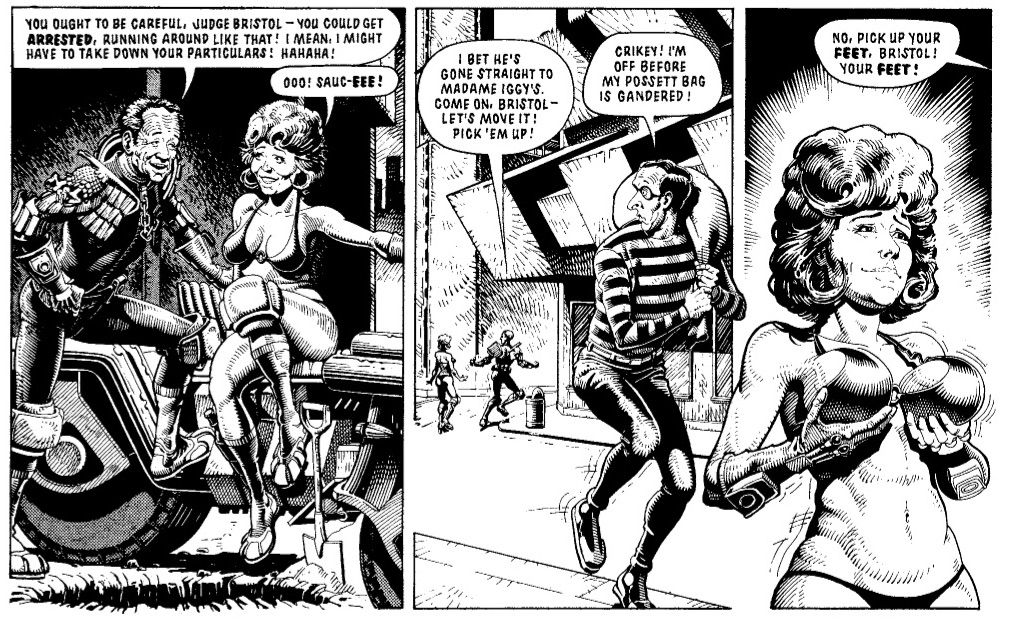
0:15:00-0:47:54: Unexpectedly, we spend a lot of time talking about Alan Grant’s writing contributions to this collection, and the many ways in which they disappoint, especially when it comes to the one-two punch that opens the book, both of which are based on sexist media from more than a decade prior to when these comics were initially published. (Related to this, we briefly touch on the Carry On movies, but don’t provide adequate explanation; read this for some more context.) Also discussed is whether or not David Roach is too classy an artist to pull off a Russ Meyer tribute (he is), the surprising number of debts this volume owes to Silver Age DC when it comes to concepts being used, and a brief overview of Alan Grant’s career inside the Dreddverse and the ways in which he betrays his own best interests that, I suspect, we may end up coming back to in future episodes.
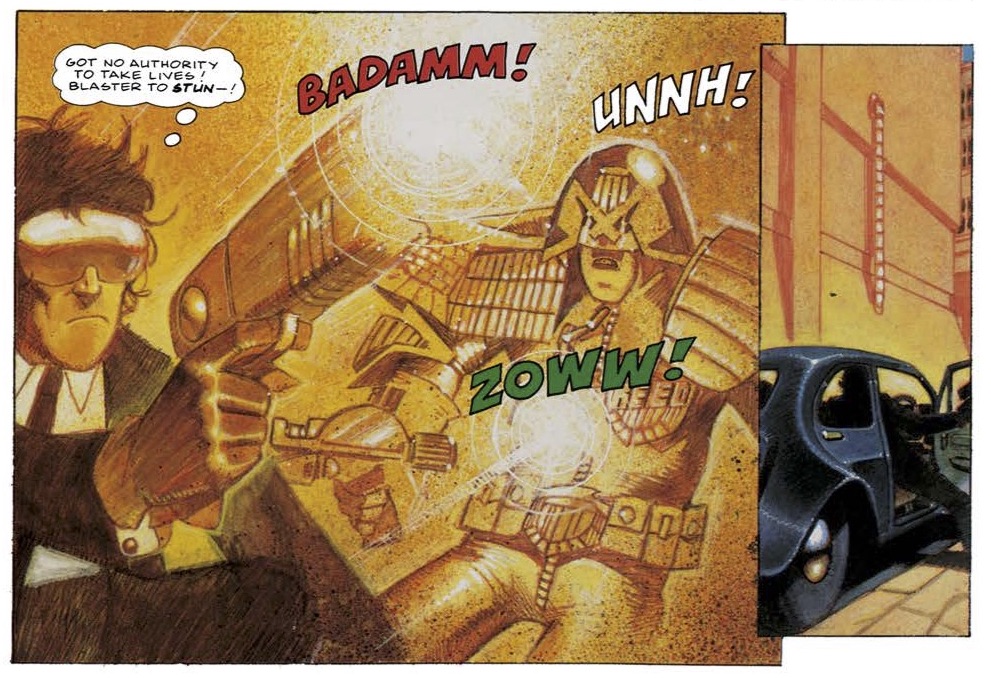
0:47:55-1:12:25: If Grant is disappointing in Restricted Files 3, his former writing partner John Wagner certainly isn’t; his stories in this volume are, for the most part, incredibly strong, with things like “Top Dogs” — the first crossover between Dredd and Strontium Dog, preceding the Garth Ennis-written “Judgement Day” by a year or so — and “Auld Acquaintance,” which sees Jeff ask if it’s okay for him to find the Scottish stereotypes quite as funny as he does. (It is, speaking as a Scot.) Wagner is as strong as we’ve seen him in awhile here, and it’s a return to form that both of us appreciate, especially when it brings with it not only understated character moments like the return of Walter the Wobot as a changed droid, but also the revival of that most understated of Dredd tropes, the out-of-control truck. It’s good stuff.
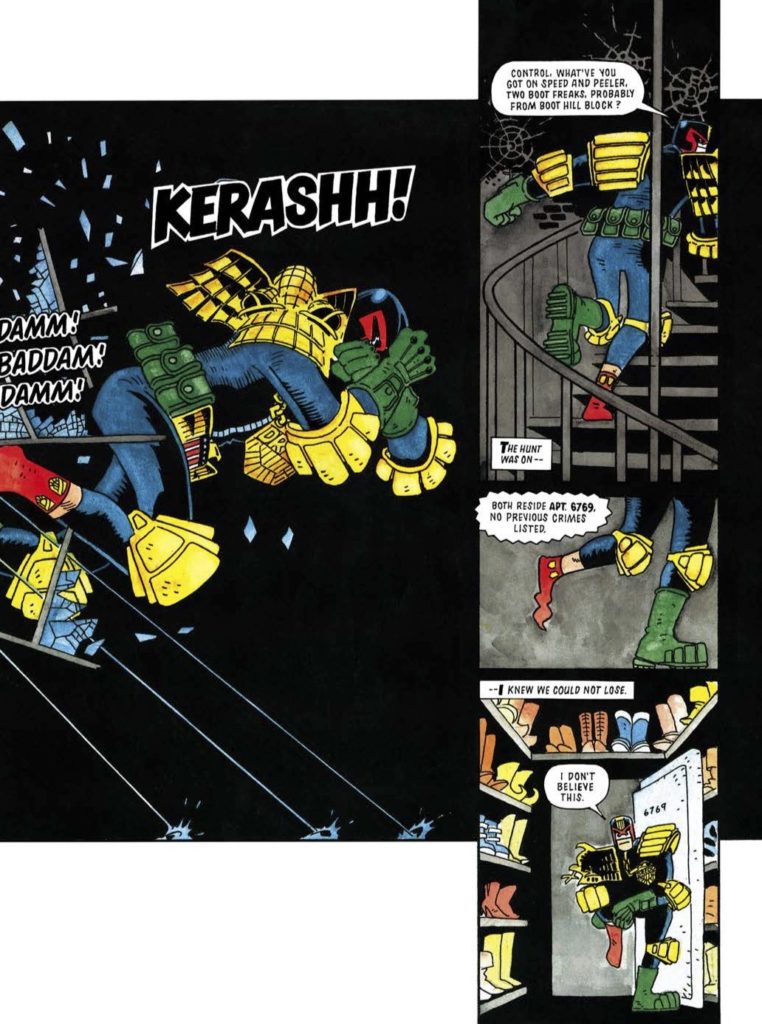
1:12:26-1:19:37: It’s not just Wagner and Grant in this book, honest; to prove it, we talk about two of the better offerings from other writers: “Hate, Inc.” from John Smith, and “Kinky Boots,” from Robbie Morrison — although, with the latter, we really spend most of the time talking about just how great Paul Grist’s artwork for the story is.
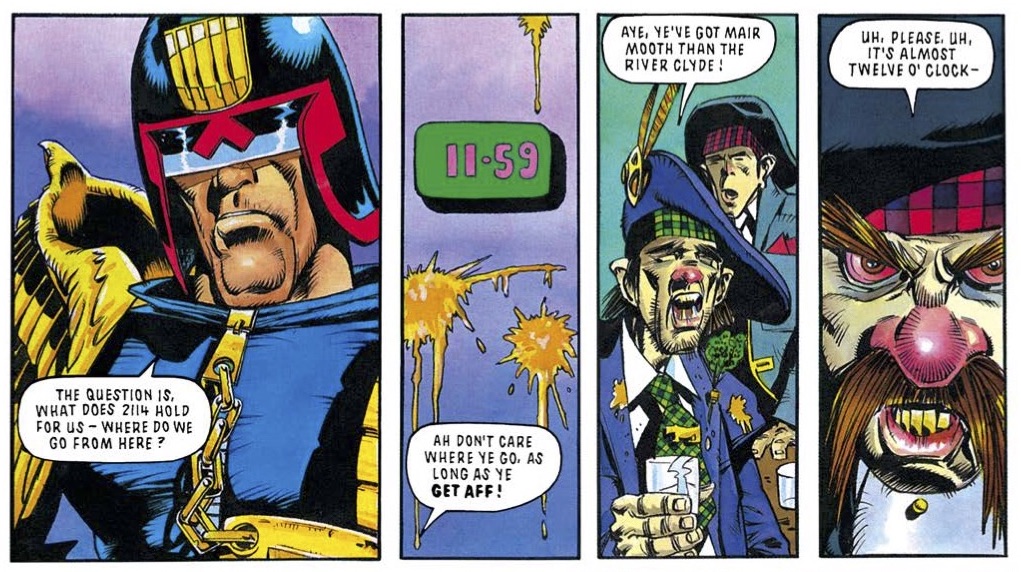
1:19:38-1:27:43: Jeff asks a surprisingly tricky question: What are the best and worst stories in this collection from Alan Grant, John Wagner and non-Wagner/Grant writers, respectively? I go for “Auld Acquaintance” as best Wagner, “Virtual Unreality” as worst Wagner, “Computer Warrior” as best Grant, “Parallel Line” for worst Grant, “Hate, Inc.” for best other, and “Roboblock” for worst other — and that last one is mostly because I didn’t need to see a shirtless Dredd sweating as the big climactic badass image. Jeff, meanwhile, picks “Top Dogs” for best Wagner, “Carry on Judging” for best Grant, agrees with me for worst Wagner and Grant, and drops either “Kinky Boots” or “Judge Planet” for best other, and “Christmas is Cancelled” for worst other, purely because he really, really doesn’t like Brett Ewins, I guess. (But he does like Mark Millar Christmas Dredds, it seems; or, at least, like to hate them.)
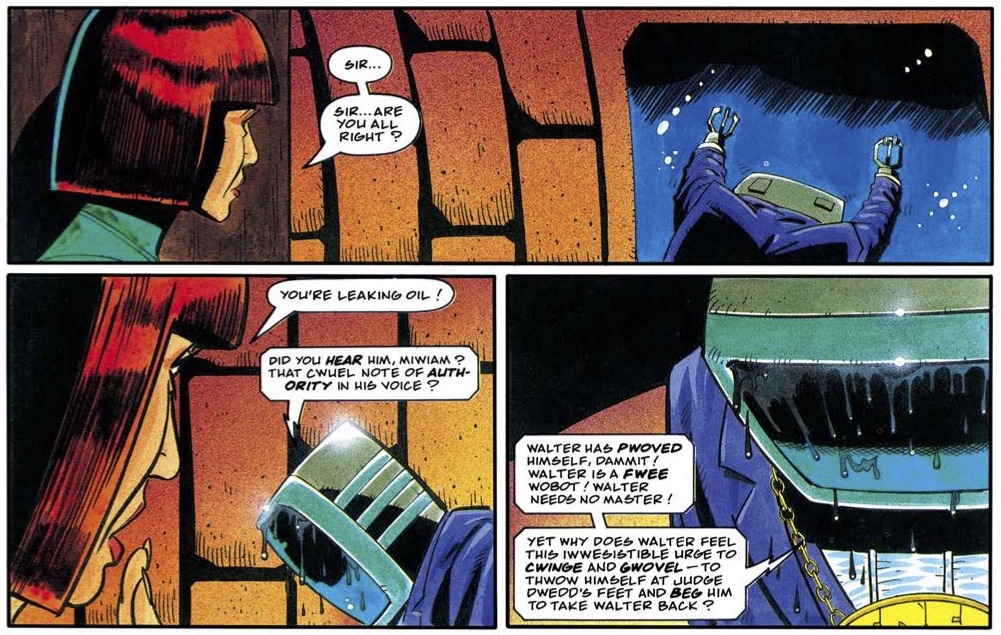
1:27:44-end: So, Drokk or Dross? It’s far too close to call for me, purely because it is such an uneven book, but Jeff is far more upbeat about the whole thing, declaring it a win. With that, we look ahead to next month, and Case Files 20, before going into our regular wrap-up mentions of Twitter, Tumblr, Instagram and Patreon. As always, thanks for reading and listening, and if Alan Grant was checking this out… sorry…?


Maybe Paul Grist’s likeness of Mrs Peel isn’t so great because he knew it was Honor Blackman sang ‘Kinky Boots’? Shot in the dark as I didn’t read this, but Paul Grist’s Dredd is a strong temptation.
I have a question for anyone who knows what the comics market was like in these years.
Who was buying things like annuals at this point? I mean literally: who was actually handing over money at the point of sale?
Because I was more tolerant of the weaker items in this than our hosts (yes, even Jonathan Livingston Dog-Vulture). But it was pure nostalgia, I’m afraid — this felt like stuff from annuals from when I was young.
Our hosts have covered this thoroughly. Annuals were stocking-stuffers, and were meant to be bought by parents for the children who would actually read the comic. I.e., the stories just had to sort of be there. It wasn’t like the comic, where the stories had to entice the young reader to shell out money at the newsagents next week for the next issue. Insofar as annuals had a selling point, it was their high quality as a physical product. And colour, of course.
So you got all sorts of things in annuals. Many stories weren’t very good, but you also got quirky things. This felt like that, “Why the hell not spend a few pages on a Hal Foster tribute that doesn’t really have a point beyond being a Hal Foster tribute? Who cares that Prince Valiant isn’t an immediately recognizable thing here like it is in America?* It’ll look pretty in colour.”
But did that approach make any sense at this point, when I think the main comic had a readership that was largely in their teens and twenties and colour and decent paper were definitely no longer special things?
However, I’m with Jeff Lester. Top Dogs alone is worth the money that I spent on this. Yes, it’s pandering to the long-time Strontium Dog fan, and all I can say is “Keep it up, Mr. Wagner, more pandering, more!”
But it’s probably good that I read Judgement Day before Top Dogs, because, wow, would it have felt like such a letdown after all the promise of the last page of Top Dogs, which evokes for a future of more wonderful appearances of Johnny and Wulf as recurring Dredd antagonists.
When one thinks of how many more pages Ennis has with which to work, it’s astonishing how ridiculously little he does to give Johnny Alpha a personality compared to all the great little touches that Wagner comes up with here.
*I assume. At any rate, the only reason why I at least had ever heard of Prince Valiant before moving to the US was Greg Stafford’s roleplaying game. Maybe it had a vast British following to which I was oblivious.
I had a slight awareness of Prince Valiant as a big deal – maybe from the Penguin History of Comics- but nothing I read drew me in until the Fantagaphics books. They’re gorgeous. It’s incidentally amusing to me that it’s mostly men that get naked and have the Dark Ages equivalent of the shower scenes in Valiant.
Courtesy of my library I have jumped ahead considerably with Dredd and I’m reading Day of Chaos Fallout at the moment. Alan Grant will write decent Dredd again and Carroll and Burn’s ‘Sealed’ was a type of Dredd story I never expected to read again.
Hello! Haven’t commented on here before but couldn’t resist replying to Voord’s question. I was 12 in 1990, roughly when this volume begins. The 1990 Judge Dredd Mega Special was one of the first 2000AD things I bought for myself (before that I’d read bits of my big brother’s Progs). I bought it specifically because it had a Carry On spoof in it, and was a big Carry On film fan at that time – something that I think has gone from seriously uncool to shameful right through to cult. So yes, to some extent I guess editorial was trying new things to reach some sort of crossover audience?
Anyway, if you want to hear more about my thoughts on that Special, I was a guest on Space Spinner 2000 (Drokk’s closest rival as far as 2000AD podcasting goes :)) earlier this year:
http://spacespinner2000.com/2020/08/27/ep-219-1990-judge-dredd-mega-special/
As for the rest of Restricted Files 3, I bought the Summer and Winter specials pretty religiously – I guess out of brand loyalty – but also, even in the 1990s and owning a Gameboy, I still wanted something to read to while away long holidays! I didn’t buy most of the Annuals, though – way too expensive.
On the whole, the further forward in time these Restricted Files get, the more I remember enjoying seeing what happened when you put unusual creators onto Dredd – and the less I understood of what I was reading, whether that’s references to Prince Valiant or whatever the hell Judge Planet is about.
(And I’ll shut up at this point, for fear of admitting that, as someone who only really got into 2000AD in 1990, I have a soft spot for Ennis and even Millar Dredd. Morrison, not so much)
Very late to reply here but there was a Prince Valiant animated series in the early 90s, so maybe that was the reason for the tribute? Although I can’t find out exactly when it aired in the UK, so I might be on a wild goose chase there. I did watch it on the BBC though.